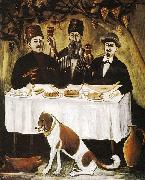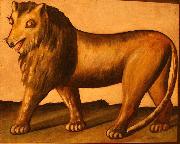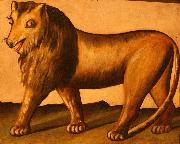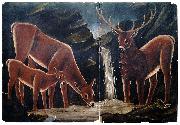Niko Pirosmanashvili Huiler la Reproduction de TableauAll Niko Pirosmanashvili Oil Paintings(born Niko Pirosmanashvili; May 5, 1862-1918) was a Georgian primitivist painter. Pirosmani was born in the Georgian village of Mirzaani to a pleasant family in the Kakheti province. His family owned a small vineyard. He was later orphaned and put in the care of his two elder sisters. He moved with them to Tbilisi in 1870. In 1872 he worked as a servant for wealthy families and learned to read and write Russian and Georgian. In 1876 he returned to Mirzaani and worked as a herdsman. Pirosmani gradually taught himself to paint. One of his specialties was painting directly into black oilcloth. In 1882 he opened a workshop in Tbilisi which was unsuccessful. In 1890 he worked as a railroad conductor, and in 1895 worked creating signboards. In 1893 he co-founded a dairy farm in Tbilisi which he left in 1901. Throughout his life Pirosmani, who was always poor, was willing to take up ordinary jobs including housepainting and whitewashing buildings. Although his paintings had some local popularity (about 200 survive) his relationship with professional artists remained uneasy; making a living was always more important to him than abstract aesthetics. |
|||

|
|||
|
|
|||
|
||||||||||||
| Niko Pirosmanashvili (born Niko Pirosmanashvili; May 5, 1862-1918) was a Georgian primitivist painter. Pirosmani was born in the Georgian village of Mirzaani to a pleasant family in the Kakheti province. His family owned a small vineyard. He was later orphaned and put in the care of his two elder sisters. He moved with them to Tbilisi in 1870. In 1872 he worked as a servant for wealthy families and learned to read and write Russian and Georgian. In 1876 he returned to Mirzaani and worked as a herdsman. Pirosmani gradually taught himself to paint. One of his specialties was painting directly into black oilcloth. In 1882 he opened a workshop in Tbilisi which was unsuccessful. In 1890 he worked as a railroad conductor, and in 1895 worked creating signboards. In 1893 he co-founded a dairy farm in Tbilisi which he left in 1901. Throughout his life Pirosmani, who was always poor, was willing to take up ordinary jobs including housepainting and whitewashing buildings. Although his paintings had some local popularity (about 200 survive) his relationship with professional artists remained uneasy; making a living was always more important to him than abstract aesthetics. |
||||||||||||
|
|
||||||||||||
| ID de tableau:: 71547 A Rich Kinto's Son A Rich Kinto's Son from 1862(1862) until 1918(1918) Oil on oilcloth 32 x 61 cm (12.6 x 24.02 in) from 1862(1862) until 1918(1918) Oil on oilcloth 32 x 61 cm (12.6 x 24.02 in) |
||||||||||||
|
|
||||||||||||
| ID de tableau:: 71839 Feast in the Grape Pergola or Feast of Three Noblemen Feast in the Grape Pergola or Feast of Three Noblemen 112 x 133 cm (44.09 x 52.36 in) 112 x 133 cm (44.09 x 52.36 in) |
||||||||||||
|
|
||||||||||||
| ID de tableau:: 72229 Lion Lion from 1862(1862) until 1918(1918) Oil on cardboard 80 X 100 cm (31.5 X 39.37 in) cjr from 1862(1862) until 1918(1918) Oil on cardboard 80 X 100 cm (31.5 X 39.37 in) cjr |
||||||||||||
|
|
||||||||||||
| ID de tableau:: 73845 Lion Lion Date from 1862(1862) until 1918(1918) Medium Oil on cardboard Dimensions 80 X 100 cm (31.5 X 39.37 in) cyf Date from 1862(1862) until 1918(1918) Medium Oil on cardboard Dimensions 80 X 100 cm (31.5 X 39.37 in) cyf |
||||||||||||
|
|
||||||||||||
| ID de tableau:: 75311 A Family of Deer A Family of Deer 1917(1917) Oil on cardboard 145 X 95 cm (57.1 X 37.4 in) cjr 1917(1917) Oil on cardboard 145 X 95 cm (57.1 X 37.4 in) cjr |
||||||||||||
|
|
||||||||||||
| Artiste précédent Artiste prochain | ||||||||||||
|
|
||||||||||||
|
Niko Pirosmanashvili (born Niko Pirosmanashvili; May 5, 1862-1918) was a Georgian primitivist painter. Pirosmani was born in the Georgian village of Mirzaani to a pleasant family in the Kakheti province. His family owned a small vineyard. He was later orphaned and put in the care of his two elder sisters. He moved with them to Tbilisi in 1870. In 1872 he worked as a servant for wealthy families and learned to read and write Russian and Georgian. In 1876 he returned to Mirzaani and worked as a herdsman. Pirosmani gradually taught himself to paint. One of his specialties was painting directly into black oilcloth. In 1882 he opened a workshop in Tbilisi which was unsuccessful. In 1890 he worked as a railroad conductor, and in 1895 worked creating signboards. In 1893 he co-founded a dairy farm in Tbilisi which he left in 1901. Throughout his life Pirosmani, who was always poor, was willing to take up ordinary jobs including housepainting and whitewashing buildings. Although his paintings had some local popularity (about 200 survive) his relationship with professional artists remained uneasy; making a living was always more important to him than abstract aesthetics. |
||||||||||||
|
|
||||||||||||
|
CONTACTER DES Etats-Unis |










